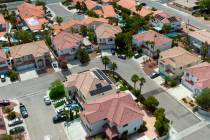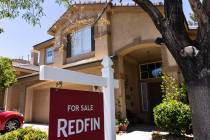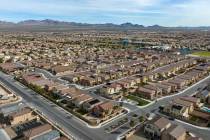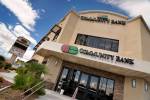Short sales of homes increasing across U.S.
LOS ANGELES - Bank-owned homes and those in some stage of foreclosure saw their share of overall U.S. home sales grow in the first quarter.
The increase was driven by a spike in short sales, or homes that sell for less than what the owner owed on their mortgage, foreclosure listing firm RealtyTrac Inc. said Thursday.
Short sales make up the vast majority of homes sold while still in the foreclosure process. Those that aren't sold or auctioned off typically end up being repossessed by banks, what most people commonly think of as foreclosures.
In the first quarter, short sales grew 25 percent from a year earlier, hitting a three-year high. In contrast, bank-owned properties declined 15 percent versus the first three months of last year, the firm said.
In Las Vegas, short sales are catching up with foreclosures. Nearly 30 percent of existing home sales in April were short sales, compared with 26 percent in March, the Greater Las Vegas Association of Realtors reported. Meanwhile, bank-owned home sales declined to 36.9 percent of April, down from 40.7 percent in March.
The trend indicates a greater likelihood that home prices will continue to soften, as foreclosures and short sales typically sell at sharp discounts.
It also suggests a shift in the way lenders handle mortgages that have gone unpaid.
Lenders may be favoring short sales rather than waiting for troubled loans to go through the foreclosure process, said Daren Blomquist, vice president at RealtyTrac.
"A short sale is a safer alternative to avoid any potential problems that they face because of the way they're processing foreclosures," Blomquist said.
Last year, mortgage lenders grappled with allegations that they had been processing foreclosures without verifying documents. The pace of foreclosures slowed sharply as the nation's biggest mortgage lenders worked out a settlement with state and federal officials. They reached a $25 billion settlement in February, clearing the way for banks to take action on unpaid mortgages.
Las Vegas-based SalesTraq showed 258 bank repossessions in April, the lowest number since the firm began tracking the data. For the past 12 months, bank repossessions declined 27.4 percent to 13,444, the firm reported.
Nevada's robo-signing law, which requires lenders to provide an affidavit of authority to foreclose, has slowed filings since it went into effect in October. Fewer than 1,000 notices of default are being filed each month, compared with 3,000 to 4,000 a month prior to the law.
The law has dampened foreclosure volume, limited overall resale supply and pushed prospective buyers to the new-home market. While these appear to be positive trends on the surface, they're likely to be temporary and extend the overall housing recovery timeline.
"The biggest winners from Assembly Bill 284 (the robo-signing law) are the banks as they have an excuse for not showing real losses on their balance sheets," said Brett Gordon of Platinum Real Estate Professionals in Las Vegas. "In the future, when history looks back at AB 284, it will be seen as a major faux pas and a key reason the real recovery of the Vegas housing market and economy was delayed by at least another three to five years."
A separate report from Santa Ana, Calif.-based CoreLogic showed 66,000 completed foreclosures nationally in April, about the same as March and down from 78,000 in the same month a year ago.
Nevada has the fourth-highest foreclosure inventory as a percentage of all mortgaged homes, tied with New York at 5 percent, according to CoreLogic. .
Review-Journal reporter Hubble Smith contributed to this report.























